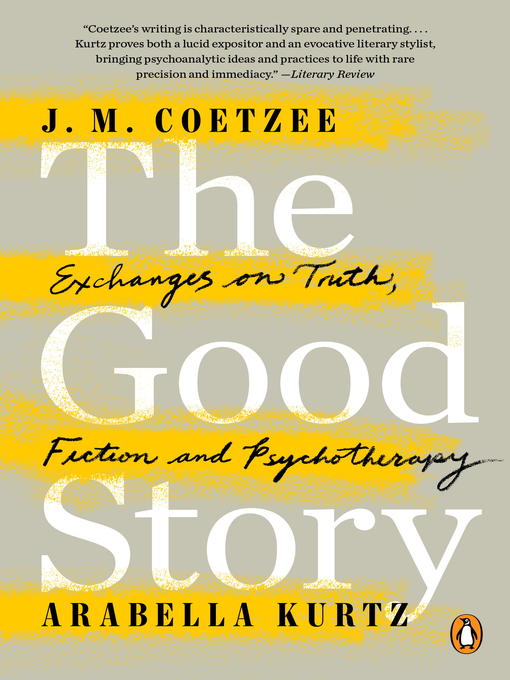
The Good Story
Exchanges on Truth, Fiction and Psychotherapy
کتاب های مرتبط
- اطلاعات
- نقد و بررسی
- دیدگاه کاربران
نقد و بررسی

August 24, 2015
In a series of conversations, recorded between 2011 and 2014, that vary from lively and engaging to staid and tiresome, author Coetzee and his friend, psychotherapist Kurtz, discuss the nature of fiction and truth. Their overriding concerns include storytelling’s power to shape the struggle between individual and society, and people’s resistance to telling their own stories without inhibition. In an early conversation, Coetzee asks whether, in telling his life’s story, he should shape the narrative to heighten drama, or instead stick to objective facts. Kurtz responds that she cannot abide by this opposition between truth and practicality, but that individuals should be content with a version of the truth that works for them. Coetzee wonders repeatedly whether a person’s past can ever be truly buried; Kurtz doesn’t believe it can. Responding to Coetzee’s fascination with how groups shape individuals, Kurtz asserts that “early family experiences” ultimately determine one’s “power for creativity or destructiveness.” Eventually, though only after Coetzee’s overbearing voice becomes wearisome, he concludes that the difference between them is that Kurtz wants to help her patients become happier through greater self-awareness, whereas he doubts such understanding is possible. Reading these rambling conversations is like stumbling onto a private conversation between two people overly absorbed in their personal intellectual games.

July 15, 2015
A discussion between the Nobel Prize-winning novelist and a clinical psychologist on the narratives that their work shares. Fans of Coetzee (The Childhood of Jesus, 2013, etc.) should be aware that his role here is more of interlocutor and provocateur and that the emphasis throughout is on psychoanalysis, with literature explored only as a means of understanding the goals and limits of therapy. "By profession I have been a trader in fictions," writes the man of literature. "From what I write it must be evident to you that I don't have much respect for reality. I think of myself as using rather than reflecting reality in my fiction." He also thinks that those who spin personal narratives in therapy are also engaged in a sort of fiction and that their efficacy lies in not how true they are but in how helpful and functional, allowing the patient to engage with the world. Kurtz seems more willing to accept a provisional sort of truth or even an objective reality, though she counters, "I am not a philosopher, I am a psychologist, and fretting about the exact nature of the Truth with a capital T is not going to meet the situation that faces me, which is that of a human being, usually in great distress and confusion, wanting sympathy and understanding." For those more interested in literary insight, Coetzee draws a parallel between "living reading," which he calls a "mysterious affair," and the challenge of therapy. "It involves finding one's way into a voice that speaks from the page, the voice of the Other, and inhabiting that voice, so that you speak to yourself (your self) from outside yourself." The explorations of narrative are frequently insightful, but the book is less like dialogue and more like an exchange of essays. Caveat lector: the authors, both intellectual heavyweights, focus much more on psychology-and group psychology, where Coetzee keeps pushing the discussion-than on literature.
COPYRIGHT(2015) Kirkus Reviews, ALL RIGHTS RESERVED.

September 1, 2015
A college professor once said to this reviewer that "writers are liars, and we shouldn't have to apologize for that." Reading this book brings that thought to mind as Nobel Prize-winning author Coetzee (Waiting for the Barbarians) and psychologist Kurtz discuss thought, memory, and personal narratives. The relay conversation between the two is engaging as they explore psychoanalysis and a patient's understanding and relation of his or her story and the doctor's obligation to encourage the authentic voice to emerge (it's not that different from writing literature). Fans of fiction will love the deep investigation of what it means to tell the truth from a scientific perspective. As is often the case with thought and brain study, literature explication, and science writing, people impassioned with the work are very thorough, and that translates to the page. However, at times the text becomes a bit heavy and less accessible to those who are unfamiliar with the subject. Nonetheless, the writing is superb and poetic. VERDICT For anyone interested in psychology, memoirs, or considering penning a memoir, this may be essential reading to build a basis for understanding self-examination. [See Prepub Alert, 3/23/15.]--Kaitlin Connors, Virginia Beach P.L.
Copyright 2015 Library Journal, LLC Used with permission.

April 15, 2015
Who better to discuss the human passion for storytelling than a Nobel Prize-winning author and a psychotherapist who helps patients relate the story of their lives in an effort to achieve understanding? This collaborative work goes beyond individual storytelling to the group efforts of schools, gangs, and colonizers to craft a narrative for everyone.
Copyright 2015 Library Journal, LLC Used with permission.

























دیدگاه کاربران